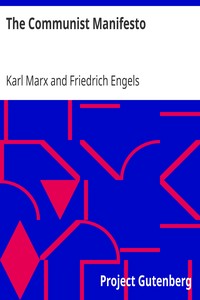The Communist Manifesto by Karl Marx and Friedrich Engels
"The Communist Manifesto" by Karl Marx and Friedrich Engels is a political pamphlet published in 1848. Commissioned by the Communist League, it presents the theory that all history is shaped by class struggle. The authors analyze how capitalism creates conflict between the working class and those who own the means of production. They predict capitalism will destroy itself through internal contradictions, leading to revolution and a classless society. The manifesto outlines transitional
policies and ends with its famous call for working-class solidarity across all nations. (This is an automatically generated summary.)
Read or download for free
| How to read | Url | Size | |||
|---|---|---|---|---|---|
| Read now! | https://www.gutenberg.org/ebooks/61.html.images | 101 kB | |||
| EPUB3 (E-readers incl. Send-to-Kindle) | https://www.gutenberg.org/ebooks/61.epub3.images | 118 kB | |||
| EPUB (older E-readers) | https://www.gutenberg.org/ebooks/61.epub.images | 117 kB | |||
| EPUB (no images, older E-readers) | https://www.gutenberg.org/ebooks/61.epub.noimages | 105 kB | |||
| Kindle | https://www.gutenberg.org/ebooks/61.kf8.images | 242 kB | |||
| older Kindles | https://www.gutenberg.org/ebooks/61.kindle.images | 233 kB | |||
| Plain Text UTF-8 | https://www.gutenberg.org/ebooks/61.txt.utf-8 | 92 kB | |||
| Download HTML (zip) | https://www.gutenberg.org/cache/epub/61/pg61-h.zip | 113 kB | |||
| There may be more files related to this item. | |||||
Similar Books
About this eBook
| Author | Marx, Karl, 1818-1883 |
|---|---|
| Author | Engels, Friedrich, 1820-1895 |
| Uniform Title | Manifest der Kommunistischen Partei. English |
| Title | The Communist Manifesto |
| Note | Translation of: Manifest der Kommunistischen Partei |
| Note | Wikipedia page about this book: en.wikipedia.org/wiki/The_Communist_Manifesto |
| Credits | Allen Lutins and Jim Tarzia |
| Reading Level | Reading ease score: 38.0 (College-level). Difficult to read. |
| Language | English |
| LoC Class | HX: Social sciences: Socialism, Communism, Anarchism |
| Subject | Socialism |
| Subject | Communism |
| Category | Text |
| EBook-No. | 61 |
| Release Date | Jan 25, 2005 |
| Most Recently Updated | Mar 2, 2022 |
| Copyright Status | Public domain in the USA. |
| Downloads | 8277 downloads in the last 30 days. |
| Project Gutenberg eBooks are always free! | |

